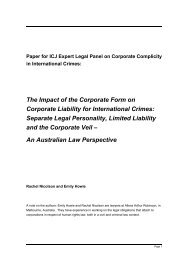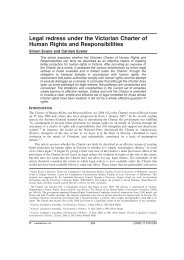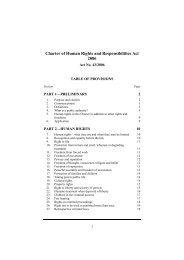Staying Civil Penalty Proceedings when Criminal Proceedings are ...
Staying Civil Penalty Proceedings when Criminal Proceedings are ...
Staying Civil Penalty Proceedings when Criminal Proceedings are ...
Create successful ePaper yourself
Turn your PDF publications into a flip-book with our unique Google optimized e-Paper software.
<strong>Staying</strong> <strong>Civil</strong> <strong>Penalty</strong> <strong>Proceedings</strong> <strong>when</strong> <strong>Criminal</strong> <strong>Proceedings</strong> <strong>are</strong> Threatened in Respectof the Same Conduct: Implications for the Right to a Fair HearingRe AWB Limited [2008] VSC 473 (12 November 2008)The Supreme Court of Victoria (Robson J) has held that civil penalty proceedings against fiveformer directors of AWB Limited should be stayed in the exercise of the Court’s inherentjurisdiction. This was on the basis that criminal proceedings <strong>are</strong> threatened against them forconduct that is substantially the same as the conduct that is the subject of the civil penaltyproceedings. Whilst the stay applications were not decided on the basis of the defendants’Charter right to a fair hearing, the principles discussed by the Court provide guidance as to howVictorian courts may give content to the right in other proceedings.FactsIn 2006, a Royal Commissioner found that AWB Limited made improper payments to the Iraqiregime whilst participating in the UN Oil-for-Food Program. The Commissioner also found that, inso doing, the company and certain persons associated with it may have breached Australian law.In December 2007, the Australian Securities and Investments Commission (ASIC) commencedcivil penalty proceedings in the Supreme Court of Victoria against six former directors of AWBLimited. ASIC alleged contraventions of ss 180 and 181 of the Corporations Act 2001 (Cth),which require company officers to act with c<strong>are</strong> and diligence and to discharge their duties ingood faith and for a proper purpose.The defendants applied to stay the civil penalty proceedings pending decisions on whethercriminal proceedings in respect of substantially the same conduct would be commenced. At thetime of making their applications, ASIC, the police and the prosecutorial agencies were continuingto investigate and consider possible criminal charges against five of the defendants (ie allexcluding Lindberg).Section 1317N of the Corporations Act provides that if criminal proceedings <strong>are</strong> commenced inrespect of conduct that is substantially the same as conduct that forms the basis of civil penaltyproceedings, the civil penalty proceedings <strong>are</strong> automatically stayed pending resolution of thecriminal proceedings.However, here the defendants sought to stay the civil penalty proceedings even before the s1317N ‘trigger’ came into effect, i.e. while criminal proceedings were under consideration but notyet commenced. This was on the basis that (amongst other grounds):• having to defend civil penalty proceedings would infringe their right of silence in the ongoingcriminal investigation and any future criminal proceedings;• the continuation of the civil penalty proceedings would attract significant publicity which mayadversely influence potential jurors in any future criminal proceedings;• having to defend civil penalty proceedings would mean that the defendants would incurunnecessary and substantial costs in proceedings that would be automatically stayed ifcriminal proceedings were commenced; and• court resources associated with hearing and determining the civil penalty proceedings wouldbe unnecessarily wasted if criminal proceedings were commenced.Reliance on the Charter
In McMahon v Gould (1982) 7 ACLR 202, the Supreme Court of Victoria held that it had aninherent power to stay civil proceedings if criminal proceedings could be commenced against adefendant in respect of substantially the same conduct. The overriding consideration was whatthe interests of justice required in the circumstances. This was to be determined by reference toa number of factors. However, generally speaking, it was a ‘grave matter’ to interfere with theentitlement of a civil plaintiff to have its action tried in the ordinary course of the procedure andbusiness of the court, requiring justification on ‘proper grounds’.However, in Reid v Howard (1995) 184 CLR 1, the High Court confirmed the fundamentalimportance of the privilege against self-incrimination, holding that it may only be abrogated bystatute, not by courts under any discretion or on a case management basis.All parties agreed that the factors set out in McMahon ought be modified in light of the HighCourt’s decision in Reid. The defendants submitted that so modified, the factors favoured thegrant of the stay.After oral argument had concluded, two of the defendants (Flugge and Ingleby) sought leave tomake further submissions to the effect that they would not receive a fair hearing within themeaning of s 24(1) of the Charter if they were forced to reveal in the civil penalty proceedingstheir defences to potential criminal charges. Those defendants submitted that under the Charter,the Court had a positive duty to enforce their right to a fair hearing by granting a stay.DecisionRobson J held that McMahon makes it clear that a civil plaintiff is not automatically preventedfrom pursuing their cause of action merely because to do so might result in the defendant havingto disclose their likely defence to any existing or potential criminal proceedings. The Court is notconcerned to preserve any tactical advantage a defendant to criminal proceedings may have as aconsequence of their right of silence. Rather, the Court must consider whether there is a realdanger of injustice if the defendant is required to reveal their criminal defence in the civilproceedings.Robson J considered that, in the instant case, there was such a real danger of injustice in respectof five of the defendants, ie those for whom criminal proceedings were ‘on the cards’. His Honourheld that it would be neither fair nor just that they should have to expend resources defending civilpenalty proceedings initiated by the state, <strong>when</strong> those proceedings were likely to be stayed as <strong>are</strong>sult of a decision of the state to commence criminal proceedings in respect of substantially thesame conduct. His Honour also considered that it would be neither fair nor just that thedefendants should have to duplicate the defence of their actions.Robson J also noted that the McMahon factors require the court to consider and weigh the effectsof a stay on the plaintiff against the effects on the defendant. In the instant case, ASIC was notpursuing the defendants in satisfaction of a private wrong. Rather, it was a regulator seeking toadvance the public interest by ensuring that alleged corporate wrongdoers were punished forcontravention of their duties and restrained from managing corporations in the future. Therewould therefore not be any prejudice to ASIC’s interests if a stay were granted.His Honour therefore stayed the civil penalty proceedings against five of the defendants(excluding Lindberg) until such time as the state indicated to those defendants that no criminalproceedings would be commenced in respect of the same conduct. Lindberg was found byRobson J to be in a different position, in that criminal proceedings were not threatened againsthim, and hence his application for a stay was dismissed.
Robson J therefore found it unnecessary to consider the Charter arguments made by Flugge andIngleby. Given that Lindberg did not make any submissions in relation to the Charter issues, hisHonour considered that it would be inappropriate to consider whether his Charter right to a fairhearing would be affected by the continuation of the civil penalty proceedings against him.Relevance to the Victorian CharterIn the course of his reasons for judgment, Robson J commented that, whilst it cannot be said thatMcMahon is no longer good law, it may be appropriate for an appellate court to review McMahonin light of the High Court’s decision in Reid. To this it may be added that McMahon may requirereview in light of the enactment of the Charter. The McMahon factors may be considered to deemphasisethe primacy of the privilege against self-incrimination, undoubtedly one of the mostimportant common law rights, which is arguably subsumed within right to a fair hearing (s 24(1)),as well as given some independent protection by the right of persons charged with criminaloffences not to have to testify against themselves or confess guilt (s 25(2)(k)).In the instant case, had the stay not been granted, the defendants’ Charter right to a fair hearingmay have been breached in two ways. If the civil penalty proceedings had continued and thedefendants maintained their right of silence during those proceedings, they may not havereceived fair civil hearings. However, if the civil penalty proceedings progressed and they activelydefended them in such a way that provided the prosecutors with additional evidence that could beused in later criminal proceedings, or revealed the defences that they were likely to adopt, theymay not have received fair criminal hearings.Robson J’s recognition that the avoidance of unnecessary cost and duplication <strong>are</strong> two factorsrelevant to the grant of a stay where civil and criminal proceedings <strong>are</strong> likely in respect ofsubstantially the same conduct is useful in elaborating what a ‘fair hearing’ constitutes. Inaddition, his Honour’s reassertion of the central importance of the right of silence, even before thecommencement of criminal proceedings, is useful to those seeking to argue that the right ofsilence is subsumed within the broader right to a fair hearing under s 24. This is particularlyimportant given that s 25(2)(k) of the Charter only protects a person from self-incrimination oncethey have been charged with a criminal offence.Additional matters of interest relating to the Charter in the instant case (which were not exploredin the reasons for judgment) include:• whether, given that the grant of a stay is almost certainly a judicial function, and hence theCourt would not be a ‘public authority’ <strong>when</strong> considering such an application, the Court has apositive obligation to use its processes to give effect to the Charter right to a fair hearing andprotection from self-incrimination; and• the applicability of the Charter to proceedings in Victorian courts <strong>when</strong> they <strong>are</strong> exercisingfederal jurisdiction (as the Supreme Court was here).The decision is available at http://www.austlii.edu.au/au/cases/vic/VICSC/2008/473.html.Daniel Perkins is a student in the Master of Laws program at The University of Melbourne


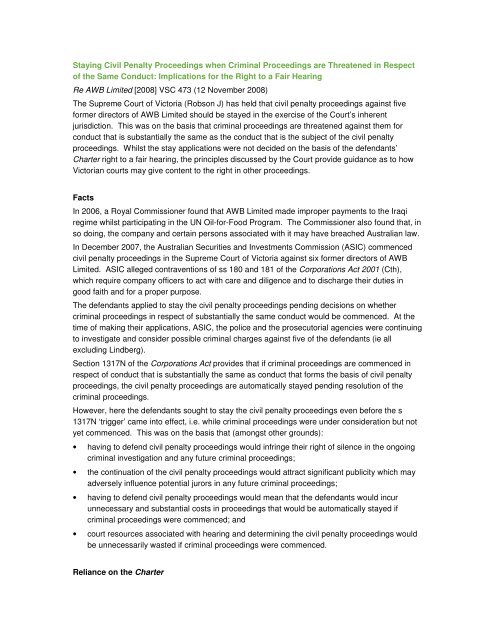
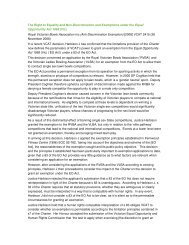
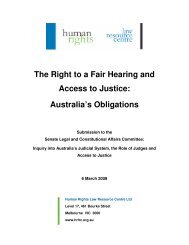
![Maslov v Austria [2008] ECHR - Human Rights Law Centre](https://img.yumpu.com/38882316/1/190x245/maslov-v-austria-2008-echr-human-rights-law-centre.jpg?quality=85)
![Kortel v Mirik [2008].pdf - Human Rights Law Centre](https://img.yumpu.com/38882257/1/190x245/kortel-v-mirik-2008pdf-human-rights-law-centre.jpg?quality=85)
